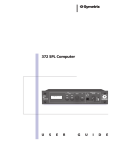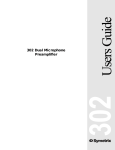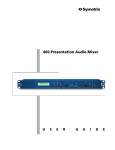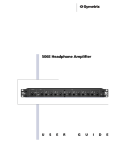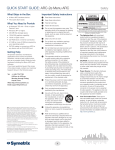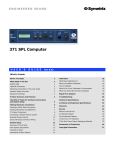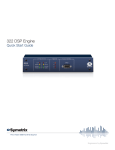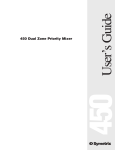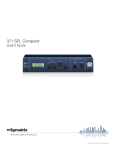Download 422 Stereo AGC/Leveler
Transcript
422 User’s Guide 422 Stereo AGC/Leveler Table of Contents Chapter 1 Introduction 1 Chapter 2 Operator Safety Summary 2 Chapter 3 Front & Rear Panel Overview 3 Chapter 4 Installation 5 Chapter 5 Operation 7 Chapter 6 Specifications 9 Chapter 7 Troubleshooting 10 Chapter 8 Warranty & Service 11 Appendix A Remote Bypass Wiring 13 Appendix B Declaration of Conformity 14 422 Stereo AGC/Leveler User’s Guide © August 2000 Symetrix, Inc. All rights reserved. Printed in the United States of America Symetrix Part Number 53422-0A02 422 The information in this guide is subject to change without notice. Symetrix, Inc. shall not be liable for technical or editorial errors or omissions contained herein; nor is it liable for incidental or consequential damages resulting from the furnishing, performance, or use of this material. Mention of third-party products is for informational purposes only and constitutes neither an endorsement nor a recommendation. Symetrix assumes no responsibility with regard to the performance or use of these products. Under copyright laws, no part of this user guide may be reproduced or transmitted in any form or by any means, electronic or mechanical, without permission in writing from Symetrix, Inc. If, however, your only means of access is electronic, permission to print one copy is hereby granted. Permission to copy the Architects and Engineers Specificiations for written proposals specifying equipment for sound reinforcement systems is, also, granted. Symetrix, Inc. 14926 35th Ave West Lynnwood WA 98037-2303 USA Tel: 425.787.3222 Fax: 425.787.3211 Web: www.symetrixaudio.com Email: [email protected] Chapter 1 Introduction Congratulations on your decision to use a Symetrix model 422 Stereo AGC/Leveler. The 422 has been designed to give professional audio users unequaled performance, ease of use, and reliability. This manual will guide you through installation and operation of the 422, and provide valuable tips on how to interface with other equipment in your system. The 422 is a singular solution for controlling unpredictable stereo (or monaural) audio levels in a wide variety of audio systems. Application environments include broadcast, recording, tape duplication and installed foreground and background systems just to name a few. The 422 excels at subtly and unobtrusively bringing level divergent audio into a “target window”, resulting in greater intelligibility and informational perception. Unlike compressor/limiters, which are effective at reducing sounds that are too loud (pushing down from the top only), the 422 provides both downward compression and upward leveling by gently adding gain to low level signals until a target level is reached. The 422 employs advanced analog signal processing technology executed with high quality industrial grade components to meet, or exceed, the highest professional audio industry standards in terms of headroom, low noise and distortion, and superb sonic qualities. The 422’s logical control panel holds no hidden surprises. The product is easy to learn and simple to use. In the sections that follow, you'll find information on installation, operation, and specific applications of the 422. We recommend that you read this manual from cover to cover. Somewhere between the confines of the two covers you should find the answers to most of your questions. If not, please feel free to contact our Technical Services Group in the following ways: US customers (888) 349-3222 T International customers (425) 787-3222 from 6:00 am to 4:30 pm Pacific Time Monday through Friday (425) 787-3211 F [email protected] DETECTOR RATIO THRESHOLD (VU) INPUT : OUTPUT 422 TARGET LEVEL PEAK LIMIT OUTPUT LEVEL SYSTEM THRESHOLD (VU) STEREO AGC/LEVELER -5 +15 LIMIT -20 BYPASS INPUT LEVEL IN BYP BYPASS -48 -42 -36 -30 -24 -18 -12 -6 0VU +6 +12 -48 -42 -36 -30 -24 -18 -12 -6 0VU +6 +12 CLIP +5 2.5 : 1 -45 422 www.symetrixaudio.com 5:1 DECREASE INCREASE -15 IN BYPASS OUTPUT LEVEL BYPASS Front panel 422 STEREO AGC/LEVELER AC INPUT 15 WATTS MAX REMOTE BYPASS POWER THIS UNIT IS MANUFACTURED IN LYNNWOOD, WA, U.S.A. LEFT OUTPUTS LEFT INPUTS RIGHT OUTPUTS RIGHT INPUTS TYPICAL CONNECTIONS: PIN 1 = SLEEVE = GROUND PIN 2 = TIP = HIGH PIN 3 = RING = LOW Input and Output connections may be Balanced or Unbalanced. XLR Pin 2 is HIGH. Rear panel 1 Operator Safety Summary Equipment Markings CAUTION RISK OF ELECTRIC SHOCK DO NOT OPEN TO REDUCE THE RISK OF FIRE OR SHOCK DO NOT EXPOSE WARNING: ELECTRIC THIS EQUIPMENT TO RAIN OR MOISTURE DE CHOC ELECTRIQUE AVIS: RISQUE NE PAS OUVRIR SEE OWNERS MANUAL. VOIR CAHIER D’INSTRUCTIONS. No user serviceable parts inside. Refer servicing to qualified service personnel. Il ne se trouve a l’interieur aucune piece pourvant entre reparée l’usager. S’adresser a un reparateur compétent. The lightning flash with arrowhead symbol within an equilateral triangle is intended to alert the user of the presence of uninsulated “dangerous voltage” within the product’s enclosure that may be of sufficient magnitude to constitute a risk of electric shock to persons. The exclamation point within an equilateral triangle is intended to alert the user of the presence of important operating and maintenance (servicing) instructions in the literature accompanying the product (i.e. this manual). Caution To prevent electric shock, do not use the polarized plug supplied with the unit with any extension cord, receptacle, or other outlet unless the blades can be fully inserted. Terms Several notational conventions are used in this manual. Some paragraphs may use Note, Caution, or Warning as a heading. Certain typefaces and capitalization are used to identify certain words. These are: 422 Note Caution Warning CAPITALS Boldface Identifies information that needs extra emphasis. A Note generally supplies extra information to help you to better use the 422. Identifies information that, if not heeded, may cause damage to the 422 or other equipment in your system. Identifies information that, if ignored, may be hazardous to your health or that of others. Controls, switches or other markings on the 422’s chassis. Strong emphasis. Important Safety Instructions Please read and keep these instructions. Heed and follow all warnings and instructions. Install in accordance with the manufacturer’s instructions. Power Source This product is intended to operate from a power source that does not apply more than 250V rms between the power supply conductors or between either power supply conductor and ground. A protective ground 2 Chapter 2 connection, by way of the grounding conductor in the power cord, is essential for safe operation. Grounding The chassis of this product is grounded through the grounding conductor of the power cord. To avoid electric shock, plug the power cord into a properly wired receptacle before making any connections to the product. A protective ground connection, by way of the grounding conductor in the power cord, is essential for safe operation. Do not defeat the safety purpose of the grounding plug. The grounding plug has two blades and a third grounding prong. The third prong is provided for your safety. When the provided plug does not fit your outlet, consult an electrician for replacement of the obsolete outlet. Danger from Loss of Ground If the protective ground connection is lost, all accessible conductive parts, including knobs and controls that may appear to be insulated, can render an electric shock. Proper Power Cord Use only the power cord and connector specified for the product and your operating locale. Use only a cord that is in good condition. Protect the power cord from being walked on or pinched, particularly at plugs, convenience receptacles, and the point where they exit from the apparatus. Proper Fuse The user accessible fuse is a part of the IEC AC inlet connector. The fuseholder accepts 5 x 20 mm diameter fuses. For 117 VAC operation, the correct value is 0.5A, 250 VAC, standard. For 230 VAC operation, the correct value is 0.25A, 250 VAC, standard. Operating Location Do not operate this equipment under any of the following conditions: explosive atmospheres, in wet locations, in inclement weather, improper or unknown AC mains voltage, or if improperly fused. Do not install near any heat source such as radiators, heat registers, stoves, or other apparatus (including amplifiers) that produce heat. Unplug this apparatus during lightning storms or when unused for long periods of time. Stay Out of the Box To avoid personal injury (or worse), do not remove the product covers or panels. Do not operate the product without the covers and panels properly installed. Only use accessories specified by the manufacturer. Clean only with a damp cloth. User-serviceable parts There are no user serviceable parts inside the 422. In case of failure, refer all servicing to the factory. Servicing is required when the 422 has been damaged in any way, such as when a power supply cord or plug is damaged, liquid has been spilled or objects have fallen into the apparatus, the apparatus has been exposed to rain or moisture, does not operate normally, or has been dropped. Chapter 3 Front & Rear Panel Overview Front view (left side) DETECTOR RATIO THRESHOLD (Vu) INPUT : OUTPUT 422 TARGET LEVEL OUTPUT LEVEL 2.5 : 1 STEREO AGC/LEVELER LIM -45 BYPASS -20 5:1 DECREASE INCREASE DETECTOR—Establishes an audio reference for the purpose of discriminating between noise and useful audio. The 422 will not attempt to apply leveling (upward gain increases) to signals that fall below the detector threshold. RATIO control—Sets the amount of downward compression for signals exceeding the target level as well as the amount of upward leveling for signals below the target level. TARGET LEVEL control—Establishes a nominal gain goal. For signals below the target level the 422 adds gain and boosts them upward. Signals above the target level are reduced in gain (downward towards the target). Front view (right) PEAK LIMIT SYSTEM THRESHOLD (VU) INPUT LEVEL IN BYP BYPASS -48 -42 -36 -30 -24 -18 -12 -6 0VU +6 +12 -48 -42 -36 -30 -24 -18 -12 -6 0VU +6 +12 CLIP +5 +15 -15 BYPASS IN BYPASS OUTPUT LEVEL 422 -5 LIMIT PEAK LIMIT control—Determines the level at which peak limiting gain reduction begins. Signals exceeding this threshold will be reduced by a ratio of approximately 15:1 (an increase of 15 dB at the input results in only 1 dB increase at the output). BYPASS/IN button—Activates relays which route the 422 input signals directly from the input connectors to the output connectors when in the BYPASS position. INPUT/OUTPUT LEDs—Indicate the higher of either left or right channel calibrated in VU (volume units). (“0” VU=+4 dBu). 3 Rear panel view (left) 422 STEREO AGC/LEVELER REMOTE BYPASS AC INPUT 15 WATTS MAX LEFT OUTPUTS LEFT INPUTS POWER THIS UNIT IS MANUFACTURED IN LYNNWOOD, WA, U.S.A. AC INPUT connector—Accepts nominal AC power sources of 117 volts or 230 volts. REMOTE BYPASS connector—Provides for the control of the BYPASS/IN function via a remote contact closure. LEFT INPUT connectors—Electronically balanced, bridging, line level inputs. XLR pin 1 is ground, pin 2 is high, and pin 3 is low. The 1/4" connector's sleeve is ground, ring is low, and tip is high. LEFT OUTPUT connectors—Electronically balanced, low impedance, line level outputs. XLR pin 1 is ground, pin 2 is high, and pin 3 is low. The 1/4" connector's sleeve is ground, ring is low, and tip is high. Rear panel view (right) RIGHT OUTPUTS RIGHT INPUTS TYPICAL CONNECTIONS: PIN 1 = SLEEVE = GROUND PIN 2 = TIP = HIGH PIN 3 = RING = LOW Input and Output connections may be Balanced or Unbalanced. XLR Pin 2 is HIGH. 422 RIGHT INPUT connectors—Electronically balanced, bridging, line level inputs. XLR pin 1 is ground, pin 2 is high, and pin 3 is low. The 1/4" connector’s sleeve is ground, ring is low, and tip is high. RIGHT OUTPUT connectors—Electronically balanced, low impedance, line level outputs. XLR pin 1 is ground, pin 2 is high, and pin 3 is low. The 1/4" connector’s sleeve is ground, ring is low, and tip is high. Note 4 For optimum immunity to noise and radio frequency interference we highly recommend connecting the 422 to balanced equipment, where possible. If this is not possible, unbalanced connections are OK. Unbalanced connections via tip-sleeve (mono) 1/4" plugs are easy to make via the 422’s 1/4" input and output connectors. Chapter 4 Installation Before you plug the 422 into a wall socket, carefully read the information in the following chapter. AC Line connection in countries outside of the European Community A sticker on the right end of the unit indicates the nominal voltage setting for the unit as it left the Symetrix factory. If this does not correspond to the voltage setting for your locale then do not attempt to apply power to the 422. Instead, return the unit to your local Symetrix distributor for modification. The 422 is shipped from the Symetrix factory with a detachable AC power cable (IEC standard) included. Depending on the intended destination, the power plug is either the US type (intended for 117 VAC use), or the Europlug type. If the power cable’s plug is not right for your locale, then please contact your local Symetrix distributor for the proper cable. Once you have determined that the 422’s operating voltage matches that of your locale and you are ready to begin, follow these steps: 1 Plug the socket end of the power cable into the recessed AC power receptacle on the back of the 422. 2 Plug the other end of the power cable into a three-hole grounded outlet or power strip. Warning The 422 is intended to be electrically grounded. It has been provided with a three-wire grounding plug—a plug that has a third (grounding) pin. This plug will fit only a grounded AC outlet. This is a safety feature. If you are unable to insert the plug into the outlet, contact a licensed electrician to replace the outlet with a properly grounded outlet. Do not defeat the purpose of the grounding plug! Mounting in an equipment rack 422 The 422 occupies one rack space (1U) in a standard equipment rack with a width of 19" (48.3 cm), a depth of 7.5" (19.1 cm), and a height of 1.75" (4.45 cm). Allow at least 4" (10.16 cm) behind the unit for the protrusion of connectors. We recommend you take care not to mount the 422 next to devices that emit large electromagnetic fields, such as audio power amplifiers. To do so may compromise the noise performance of the 422. The 422 has been designed to conform to mechanical guidelines as described in EIA Standard RS-310-C and IEC Recommendation 297. Recommended audio cable wiring For optimum system performance we recommend that the 422 be connected to balanced signal sources. If this is not practical in your situation, then you may connect to unbalanced sources. The diagram on the next page illustrates recommended cable wiring practices. 5 Source device output 2 31 (Balanced) 23 1 (Balanced) Tip Male 1/4" tip-ring-sleeve plug Tip = high Ring = low Sleeve = ground 2 31 Female XLR Pin 1 = ground Pin 2 = high Pin 3 = low 422 Input Ring Male XLR Pin 1 = ground Pin 2 = high Pin 3 = low Male XLR Pin 1 = ground Pin 2 = high Pin 3 = low Sleeve Sleeve Tip Male 1/4" tip-ring-sleeve plug Tip = high Ring = low Sleeve = ground (Balanced) Ring Ring Male 1/4" tip-ring-sleeve plug Tip = high Ring = low Sleeve = ground Tip Sleeve Sleeve Sleeve (Unbalanced) Male 1/4" tip-sleeve plug Tip = high Sleeve = ground Male 1/4" tip-sleeve plug Tip = high Sleeve = ground Tip Tip Destination device input 422 Output 2 31 Tip (Balanced) 2 31 Female XLR Pin 1 = ground Pin 2 = high Pin 3 = low (Balanced) 2 31 Female XLR Pin 1 = ground Pin 2 = high Pin 3 = low Ring Male XLR Pin 1 = ground Pin 2 = high Pin 3 = low Male 1/4" tip-ring-sleeve plug Tip = high Ring = low Sleeve = ground Sleeve Sleeve Male 1/4" tip-ring-sleeve plug Tip = high Ring = low Sleeve = ground (Balanced) Tip Ring Ring Tip Male 1/4" tip-ring-sleeve plug Tip = high Ring = low Sleeve = ground 422 Sleeve 6 Sleeve Sleeve (Unbalanced) Male 1/4" tip-sleeve plug Tip = high Sleeve = ground Tip Male 1/4" tip-sleeve plug Tip = high Sleeve = ground Tip Chapter 5 Operation The TARGET LEVEL control When setting up the 422, this is generally the control that you should adjust first. The TARGET LEVEL control does just what the name implies. It establishes the volume where you want it. Technically, the control sets a threshold. Incoming signals that exceed this threshold are compressed downward towards the threshold. Incoming signals below the threshold are expanded (leveled) upward towards the threshold. The 422’s output is a reduced dynamic range replica of its input, centered around the target level. As you adjust the TARGET LEVEL control, it’s very easy to see and hear the results. A quick glance at the OUTPUT level VU meter will show you the exact effects of increasing or decreasing TARGET LEVEL. The DETECTOR control The DETECTOR control increases or decreases the sensitivity of the 422 to low level audio signals and noise. As you turn this control counterclockwise, the 422 reaches down and increases the gain of low level audio and/or noise. The optimum setting of this control is entirely dependent upon the nature of the audio that the 422 is processing. For example, if the audio source is relatively clean and quiet (like a CD), the position of the DETECTOR may be noncritical. To greatly increase the volume of the low level signals on the CD, try a full counterclockwise setting of the control (–45). On the other hand, if you try the same extreme setting with a noisy cassette recording, you may not find the results to be pleasing. If you’re processing a very noisy source, then turn the detector control clockwise towards the –20 setting until the desired sound is achieved. If you’re unsure of where to position the DETECTOR control, then start with it straight up in the twelve o’clock position. We’ve found this to be a good compromise for unpredictable audio sources. The RATIO control The optimum setting of this control is usually dictated by the particular type of material one is processing, and the desired effect. For example, if the 422 is part of a foreground/background music/paging system in a high ambient noise environment, a higher ratio will produce maximum intelligibility. As part of a broadcast chain, where the process itself must be as subtle as possible, a 2.5:1 or lower ratio is advisable. If you’re unsure of where to position the ratio control, then we suggest you start in the twelve o’clock position and make upward and downward adjustments from there as you listen and evaluate the results. The PEAK LIMIT control The PEAK LIMIT control sets an absolute ceiling threshold level to which the maximum output level is limited. The control is calibrated in VU (volume units). The PEAK LIMITER is useful in any application where it is desired to prevent overload of subsequent system components. This may include applications such as high volume music systems in clubs and theatres, or transmission line applications such as AM/FM radio and television. When the control is turned to its full clockwise rotation, the PEAK LIMITER is bypassed. As the control is rotated counterclockwise, the threshold is moved lower and the resultant limiting can be observed as a reduction in overall output level on the OUTPUT LED meter. The optimum setting for the PEAK LIMIT control is most often correlated directly to requirements of downstream system components. If you're unsure of where to set the control, then you may want to try this: observe the OUTPUT level display and note the average output level, then adjust the PEAK LIMIT control 10-12 dB above the average output level. Set this way, the peak limiter will provide protection without over limiting the signal. The LIMIT LED should only come on occasionally. If it stays on constantly then your are applying too much limiting and should turn the PEAK LIMIT control 7 422 The RATIO control is used to increase or decrease the degree of leveling. At high ratios, the program density increase results in a more present or up front sound. At low ratios, the 422 performs subtle, yet effective, automatic gain riding. At a setting of 5:1 (maximum) the effect of the 422 AGC/leveling process is very audible. clockwise to reduce the amount of limiting. If you do not have a clearly identified need to peak limit your signal, then we recommend that you turn the PEAK LIMIT control to the fully clockwise BYPASS position. The SYSTEM BYPASS/IN button The BYPASS/IN button places the 422 in either BYPASS or IN (CIRCUIT) modes. In BYPASS mode the incoming signals are directly routed (via relays) to the 422’s outputs, thereby bypassing any internal circuitry. In BYPASS mode the front panel rotary controls have no effect on the operation of the 422. A red LED indicates BYPASS status, while a green LED indicates IN status. The INPUT AND OUTPUT level meters 422 The INPUT and OUTPUT level meters are calibrated in VU (volume units). The meters read the greater of either left or right channel signal levels. The meters give an indication of absolute signal levels, and show the exact relationship between input and output signals as a result of various settings of the 422’s controls. 8 Chapter 6 Specifications 422 Specifications Input/Output Inputs Outputs Input Connectors Output Connectors Polarity Stereo, Balanced Bridging or Unbalanced Stereo, Balanced or Unbalanced ˘" TRS, XLR and RCA ˘" TRS, XLR and RCA Input: tip is high, ring is low, sleeve is ground Output: tip is high, ring is low, sleeve is ground Maximum Input Level +24 dBu Maximum Output Level +22 dBu into 600 Ohms Performance Data Frequency Response 0 dB ±1 dB, 20 Hz - 20 kHz THD+Noise .05%, 0 dBu in, 10 dB gain reduction, 1 kHz Dynamic Range >110 dB Crosstalk -60 dB, +20 dBu in, 20 Hz - 20 kHz AGC Detector Range -70 dBu to 0 dBu Ratio 1:1 to 5:1 Target Level Range 30 dB Limiter Threshold -15 dBu to +25 dBu Limiter Ratio >15:1 Input Common Mode Rejection 40 dB @ 1 kHz Output Noise -90 dBu, broadband Physical Size (hwd) 1.72 x 19 x 5.5 inches, 4.37 x 48.26 x 13.97 centimeters Shipping Weight 8 lbs (3.63kg) Electrical Power Requirements 117V nominal, 105 to 130V AC, 50 to 60 Hz, 12 watts 230V nominal, 207 to 255V AC, 50 Hz, 12 watts Note The maximum operating ambient temperature is 25 degrees C. 422 Architects and Engineers Specifications The Automatic Gain Controller (AGC-Leveler) shall be a stereo model that reduces the dynamic range of wide range, wideband audio signals and provides peak limiting. The AGC shall occupy one rack space (1U). The AGC-Leveler shall be capable of controlling audio signals ranging from –70 dBu to +24 dBu and reducing their range by an input/output ratio of from 1:1 to 5:1. A target output level control shall be provided to shift the level of the output signal over a nominal ±20 dB range. The release time of the AGC shall be controlled by the presence and nature of input signals. The AGC-Leveler shall provide identical peak responding input and output level meters. These meters shall be capable of responding to signals ranging from –48 VU to +12 VU (–50 dBu to +16 dBu). An output clipping indicator shall be provided. The inputs shall be active balanced bridging designs terminated with 3-pin XLR (AES/IEC standard wiring) female and 1/4" (tip-ring-sleeve) jacks. The outputs shall be active balanced designs terminated with 3-pin XLR (AES/IEC standard wiring) male and 1/4" (tip-ring-sleeve) jacks. Overall frequency response shall be 20 Hz to 20 kHz, ±1 dB, measured at +4 dBv output. There shall be no more than 0.02% harmonic distortion measured under the following conditions: +4 dBu input, +4 dBm output, BYPASS switch out, 1000 Hz test frequency. Residual noise output shall be no greater than –90 dBu measured in a 20 kHz noise bandwidth with an rms responding meter. When the unit is inoperative (either by loss of power, or via the BYPASS switch), the inputs and outputs shall be wired together. A REMOTE BYPASS facility shall be provided whereby an external contact closure shall force the AGC-Leveler into BYPASS mode. The AGC-Leveler shall be capable of operating by means of its own built-in power supply connected to 117V nominal AC (105 to 130V) 50/60 Hz and 230V nominal AC (207 to 253 VAC). The AGC-Leveler shall be a Symetrix, Incorporated model 422 Stereo AGC-Leveler. 9 422 The AGC-Leveler shall also contain an integral peak limiter having at least a 15:1 ratio and adjustable threshold level. A green LED indicator shall be provided to indicate peak limiter activity. The peak limiter threshold shall determine the absolute maximum output amplitude of the AGC-Leveler regardless of other conditions. Troubleshooting Chapter 7 SYMPTOM PROBABLE CAUSE There is no output signal Check the AC power connections to the 422. Check input and output cables and connections. Determine that there really is a signal coming from the source and that it is getting to the 422. Distortion in the output signal Check the input signal. Is it overdriving the 422’s input? Is the incoming signal already distorted? Listen “up stream” from the 422 (or manually place the unit in BYPASS mode) to determine that you are feeding it a clean signal. Buzz in the output Check input and output connector wiring. Check for ground loops between interconnected system equipment. Are all system components on the same AC ground? Noise (hiss) Check input signal levels and input level control settings. The input may be too low in level. If so, boost the signal from your console or input source. Is the input signal already noisy? Disconnect the inputs from the 422 and listen for noise at the output. If the noise is gone, then the problem is prior to the 422. 422 The 422 doesn’t power up or doesn’t respond properly. 10 Consult a qualified service technician or the Symetrix factory. Important Information Regarding Your Warranty We would like to offer you an incentive to complete our product registration form. Either fully complete and mail your product registration card or register online at www.symetrixaudio.com. You will then have a total of 5 years of warranty coverage, under the terms and limitations as set forth below, without additional cost. Warranty & Service repaired under warranty will be shipped to Buyer freight prepaid by Symetrix via United Parcel Service (surface) or any similar shipper, to any location designated by buyer within the Continental United States. At Buyer’s request and expense Product will be returned via airfreight. Outside the continental United States, repaired or replaced products will be returned freight collect. Symetrix, Inc. expressly warrants to the original purchaser (“Buyer”), subject to the terms and conditions set forth below, that the Product will be free from defects in material and workmanship as a result of normal commercial use for one (1) year from the date of purchase. This warranty will be automatically extended (subject to the additional limitations set forth below) for an additional four years if the Warranty Registration is completed and returned to Symetrix (or completed online) within thirty (30) days of the date of delivery. THIS WARRANTY IS EXPRESSLY IN LIEU OF ALL OTHER WARRANTIES EXPRESS OR IMPLIED, ARISING BY LAW OR OTHERWISE (INCLUDING, WITHOUT LIMITATION ANY OBLIGATIONS OF THE SELLER WITH RESPECT TO CONSEQUENTIAL DAMAGES) INCLUDING THE WARRANTIES OF MERCHANTABILITY AND FITNESS FOR USE AND OF ALL OTHER OBLIGATIONS OR LIABILITIES ON OUR PART, AND WE NEITHER ASSUME, NOR AUTHORIZE ANY OTHER PERSON TO ASSUME FOR US, ANY OTHER LIABILITY IN CONNECTION WITH THE SALE OF THE PRODUCT. THIS WARRANTY SHALL NOT APPLY TO THIS PRODUCT OR ANY PART THERE OF WHICH HAS BEEN SUBJECT TO ACCIDENT, NEGLIGENCE, ALTERATION, ABUSE, OR MISUSE. WE MAKE NO WARRANTY WHATSOEVER IN RESPECT TO ACCESSORIES OR PARTS NOT SUPPLIED BY US. THE TERM “ORIGINAL PURCHASER,” AS USED IN THIS WARRANTY SHALL BE DEEMED TO MEAN THAT PERSON OR COMPANY THAT ORIGINALLY PURCHASED THE PRODUCT. Symetrix’s warranty obligation is limited to the repair, replacement, or refund at Symetrix’s sole discretion, of the part or parts of the Product which may thus prove defective in materials or workmanship within one year from date of purchase (or five years from the date of purchase if Buyer has registered its purchase as provided above) under normal use and which our examination discloses to our satisfaction to be thus defective, provided that Buyer gives Symetrix prompt notice of its warranty claim and satisfactory proof thereof. This Symetrix product has been designed and manufactured for use in professional and studio audio systems and is not intended for other usage. This warranty only applies to Buyers using the Product in professional and studio audio systems. With respect to others, including but not limited to consumers for personal, family, or household use, Symetrix expressly disclaims all warranties, including but not limited to warranties of merchantability and fitness for a particular purpose and the express warranties as otherwise provided herein. Symetrix will make every reasonable effort to ensure that parts are available to support the repair of our products under warranty. In the event that a product or component part thereof becomes obsolete, unavailable or irreparable, Symetrix reserves the right to refund a prorated portion of the purchase price in full satisfaction of all warranty claims. A refund of the purchase price is prorated as follows: 100% through year one, 80% through year two, 60% through year three, 40% through year four and 20% through year five. Symetrix reserves the right to modify the design or make additions to, or improvements to, its product lines without making similar upgrades to Product purchased by Buyer. Symetrix does not authorize any third party, including any dealer or sales representative, to assume any liability, effect any repairs or modifications to the Product, or make any additional warranties or representation regarding the Product or Product information on behalf of Symetrix. If you don’t register your product, you will still receive one year of warranty coverage, but it only takes a minute to fill out the card or register online and we won’t share your personal information with others. Following are the terms and limitations of the Symetrix warranty. Warranty In order to serve you better we request that the Buyer shall, prior to shipping Product to Symetrix for warranty service, contact Symetrix and secure a Return Authorization Number that shall be included with the returned Product. This will facilitate our efforts to keep track of your Product and process your warranty repair as quickly as possible. Buyer will prepay all freight charges to ship the Product to Symetrix for warranty inspection and service. This warranty is subject to Symetrix’s inspection of the Product at its facilities and, upon Symetrix’s request, satisfactory proof of purchase (dated copy of original retail dealer’s invoice.) Symetrix reserves the right to effect repairs to the product with reconditioned components/parts. Products once Symetrix’s total liability on any claim, whether in contract, tort (including negligence) or otherwise arising out of, connected with, or resulting from the manufacture, sale, delivery, resale, repair, replacement or use of Product will not exceed the purchase price of the Product or any part thereof which gives rise to the claim. In no event will Symetrix be liable for any incidental or consequential damages including but not limited to damage for lost revenue, cost of capital, claims of customers for service interruptions or failure to supply, and costs and expenses incurred in connection with labor, overhead, transportation, installation or removal of products or substitute facilities or supply houses as a result of Product failure. This limited warranty gives Buyer certain rights. Buyer may have additional rights under applicable law. 11 422 Chapter 8 Where to Get Service If outside of the USA If you have determined that your 422 requires repair services and you live outside of the United States, please contact your local Symetrix dealer or distributor for instructions on how to obtain service. If inside the USA Symetrix will perform in-warranty or out-of-warranty service on any product it has manufactured for a period of five years from date of manufacture. If you reside in the USA, then proceed as follows: In-Warranty Repairs Repairs made in-warranty will cost you only one-way freight charges. We’ll prepay the return (surface) freight. Of course, if the repair is due to operator error, parts and labor will be charged. If there are charges for the repair costs, you will pay for the return freight. All charges will be COD unless you have made other arrangements (prepaid, Visa, or Mastercard). Out-of-Warranty Repairs If the warranty period has passed, you’ll be billed for all necessary parts, labor, packaging materials, and freight charges. To Get Your 422 Unit Repaired (USA Customers Only) 1 Call our Technical Services Group for a return authorization (RA) number. (888) 349-3222, Monday through Friday, 6:00 am to 4:30 pm Pacific Time. Have your serial number ready to give to the service representative. Pack the unit in its original packaging materials. 3 Include your name, address, daytime telephone number, and a brief statement of the problem. 4 Write the RA number on the outside of the box. 5 Ship the unit to Symetrix, freight prepaid. We do not accept freight collect shipments. 422 2 Symetrix, Inc. 14926 35th Ave West Lynnwood WA 98037 If You Don't Have Factory Packaging Materials If you send us your product in substandard packaging, we will charge you for factory shipping materials. If you don’t have the factory packaging materials, do the following: 1 Select an oversized carton. 2 Wrap the unit in a plastic bag, and surround it with bubble-wrap. 3 Pack the box full of Styrofoam peanuts. Be sure there is enough clearance in the carton to protect the rack ears. We will return the unit in Symetrix packaging. 12 Appendix A Remote Bypass Wiring For those installations that may require remote bypassing of the 422’s functions, a rear panel jack has been provided to accept an external switch for this purpose. The external switch should be a high quality, industrial grade, single pole, double throw toggle switch. We highly recommend that shielded wire be used to connect the switch to the 422 so as to minimize the possibility of introducing any radio frequency interference into the 422. The external 1/4" audio plug should be of the tip-sleeve type (often referred to as a “mono” plug). The following diagram illustrates recommended wiring practice. Bypass In (operate) User supplied remote bypass circuitry The cable should be wired as shown above and as described below: The tip of the 1/4" plug is soldered to one end of the “signal” wire of a coaxial cable. 2. One end of the shield of the coaxial cable is soldered to the sleeve of the 1/4" plug. 3. The other end of the “signal” wire is soldered to the common terminal of a single pole, double throw switch. 4. The remaining shield is soldered to either of the remaining terminals of the switch (one terminal remains unconnected). 422 1. 13 Declaration of Conformity Appendix B Declaration of Conformity We, Symetrix Incorporated, 14926 35th Ave. West, Lynnwood, Washington, USA, declare under our sole responsibility that the product: 422 Stereo AGC-Leveler to which this declaration relates, is in conformity with the following standards: EN 60065 Safety requirements for mains operated electronic and related apparatus for household and similar general use. EN 50082-1 Electromagnetic compatibility - Generic immunity standard Part 1: Residential, commercial, and light industry. The technical construction file is maintained at: Symetrix, Inc. 14926 35th Ave. West Lynnwood, WA, 98037-2303 USA 422 The authorized representative located within the European Community is: World Marketing Associates P.O. Box 100 St. Austell, Cornwall, PL26 6YU, U.K. 14 Date of issue: 18 January, 1995 Place of issue: Lynnwood, Washington, USA Authorized signature: Dane Butcher, President, Symetrix Incorporated. 15 422 422 16 Symetrix, Inc. 14926 35th Ave. West Lynnwood, WA, 98037-2303 USA Tel: (425) 787-3222 Fax: (425) 787-3211 Web site: www.symetrixaudio.com Email: [email protected]




















